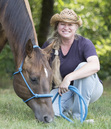Elena Hartwell's Blog, page 81
March 1, 2016
Three Authors, Three Questions, Three New Novels
Jennifer Kincheloe, John A. Connell, Bryan Robinson
Jennifer Kincheloe
What are you most looking forward to as a debut author in 2016? More than anything, I look forward to connecting with readers. When someone approaches me either in person or on-line to say that they read my book and liked it, it sends me over the moon. Readers sometimes tell me who they want to play Anna Blanc in the movie, and that's fun. I hope someone will make Anna Blanc fan art! It would make my day.
What drew you to the time period? (1907) and how did you go about the research of that period?THE SECRET LIFE OF ANNA BLANC was my first foray into fiction. Before I wrote Anna Blanc, I’d written some bad poetry, and a contemporary screenplay about two kids who travel the world hunting down a terrorist (also dire).
By chance, I stumbled across a short article on-line about the first female police officer in Los Angeles in 1910. Her name was Alice Stebbins Wells, and she began her career as a police matron. Later, she was promoted to cop.
Alice awed me, and I wanted to write something in her honor. THE SECRET LIFE OF ANNA BLANC takes place in 1907 among the police matrons of the Los Angeles Police Department (LAPD).
Researching the era was an enormous undertaking, and listing all my sources would crash the website. I’ll mention a few. History books tend to leave women out, and this was a novel about women. So, I relied on primary sources, especially those written by, for, or about women. I read newspaper articles on lady cops, police matrons, prostitution, and crimes against women. I dug up court transcripts, eyewitness accounts, and the memoirs of a police matron. Because my protagonist is a socialite as well, I read etiquette guides, grooming how-tos, and marriage and courting advice books.
To master the zeitgeist of the era, I immersed myself in popular culture—movies, dance, music, humor, and cartoons. Also, I collected thousands of pictures of clothes, jewelry, art, architecture, as well as street photography.
(Check out my Pinterest Page at https://www.pinterest.com/jrkincheloe)
The same year the fictional Anna Blanc was hired by the LAPD, Mary Roberts Rinehart, known as the American Agatha Christie, was writing her own female sleuth in The Circular Staircase. This and other novels (Sherlock Holmes, Peter Pan, The Wizard of Oz, to name a few) were great sources for cultural references, social mores, and slang.
After finishing the book, I contacted a historian who specializes in 1900s Los Angeles and had her read the novel for accuracy. She gave it the thumbs up.
That’s the short version.
Final Words of Wisdom:Writing can be a brutal road, and very few of us make a living at it. The trick is to be grateful—grateful for the time you have to write, for your community of fellow writers, and for every single reader.
Also, if you don’t have a supportive writers’ community, find one. They will see your potential, encourage you, and make you better.
John A. Connell
How has living in Madrid impacted your writing?My wife and I moved to Madrid 4 months ago, but before Madrid I lived 11 years in Paris, France. So, I can speak more of the impact on my writing from my experiences in Paris than Madrid.
When many people learned that I lived in Paris, they said, “Oh, Paris must really inspire you.” Well, yes, the beauty and history of that great city have been inspiring, and many great American writers have spent time there, but great writers have lived and written everywhere, so there’s no particular magic in the air in Paris. I will say the crappy weather nine months out of the year inspired me to stay inside and get my work done. And nothing puts me in a better mood to write about murder and mayhem than a gloomy day. Now, I’ll just have to adapt my writing to more sunny climes of Spain!
My expat experiences, that notion of being a foreigner in a foreign land, has had an influence on how I developed my protagonist, Mason Collins. And it’s why I’ve chosen to keep Mason in the “Old World” of Europe in successive books. I’ve gained a different perspective of who I am living away from the land and people where I grew up. What’s interesting—at least to me—is that I wasn’t aware of how my expat-ness had seeped its way into my protagonist and my story until later, after I had finished the first in the series, Ruins of War . That’s when I decided to make both Ruins of War and SPOILS OF VICTORY a kind of the origin story for Mason’s future wanderings—masterless, homeless, and always short of cash, like the errant knight or wandering samurai. In fact, How did working in the film industry impact your writing?I’ve had the privilege to work with some great directors, screenwriters, and cinematographers, and my writing is, in part, a product of what I learned from those artists. My position as a motion picture camera operator gave me the opportunity to be up close and personal with many of the inside workings on the set. Everything I observed has in some fashion found its way into how I approach my writing. I’m not going to claim to have reached that level of artistry, but I keep them in mind, like added tools in the writing toolbox.
Actually, the projects that have inspired me the most were the TV shows I’ve worked on: Picket Fences and The Practice by There was also executive producer of NYPD Blue, Finally, my work as a camera operator has influenced me in many ways. Consequently, I’m a visual guy, and I try to apply that in writing descriptions. As a camera operator, framing of a scene is vital: What to reveal and how to reveal it, whether it’s a big wide frame, showing everything, or a close-up of someone’s eyes or hands or feet. When peering through the viewfinder, you forget the lights, the cables, and the crew, and watch the actors and action like a privileged observer. And that’s exactly how I construct a scene, visually imagining it before I write it.
Any final words of wisdom for aspiring authors?I’d say the most important advice, and one that I still apply to my writing, is to forgive yourself for bad writing. Hemingway said, “all first drafts are s#&t.” And I’ve heard the same thing from many successful writers, though in less colorful terms. I have to remind myself everyday that the writing doesn’t have to be brilliant or perfect the first go around. In fact it rarely is. You will have good days, where the writing flows out onto the page, and that’s great. But there will be many more days when it seems that everything you’re putting on the page is total crap. When I was first started writing, that inner critic would shut me down. Ignore that voice! I recite Hemingway’s line almost everyday, then I put my head down and keep going. You have to know that you can fix it all in the rewrites. Rewriting and more rewriting is what’s going to make to make your manuscript shine.
Bryan RobinsonHow has your career in psychotherapy impacted your writing? Psychotherapy has indeed affected my writing in many ways. My protagonist in the mystery series is Dr. Brad Pope, a psychologist, who is able to solve murders by looking beneath the surface into the depths of human behaviors. A reluctant sleuth, he outsmarts the cops when they fumble the ball.
A second advantage is that my experience with the mind allows me to bring in psychological terms and techniques in a very readable way and to show the internal conflicts of my protagonist who, although a psychologist, has his own internal demons with which he struggles.
In the nonfiction realm, I have come to realize that while there are numerous books on writing craft, there are none on the psychological aspects of writing and how to develop perseverance and resilience in the brutal publishing world. To that end, I just signed a contract with a mystery publisher for my book, Don't Murder Yourself Before Finishing Your Mystery: Daily Meditations for Writers' Resilience, which is a self-help book for aspiring scribes and seasoned writers on hanging in there and not giving up, no matter what.
In some ways, most writers—especially mystery writers—are psychologists as they write the motivations for murder and get inside of the mind of their characters. The concept of Limestone Gumption comes from solid theory and research—that yielding to the forces we cannot control empowers us—that grass grows through concrete. Many of the characters in the novel must call on their limestone gumption to get through troubling times, especially the protagonist who finds his gumption when accused of the murder. In psychotherapy, having limestone gumption is equivalent to being your resilient zone—that place where you feel confident, calm, clear, and courageous.
I think being a psychotherapist helped me use real-life settings to mirror a character’s mood and mindset. I use the Suwannee River and underwater caves as essential inter-workings of the minds of the characters. I use the river and caves as threads to weave parallels to the plot and character development. For example, the title of the book originated from the fact that for centuries the Suwannee River has cut through limestone, forming huge underwater caverns. The limestone yields to the force of the river instead of resisting it. Through yielding, the limestone becomes a feature of the river, a beautiful and smooth, well-polished cavern, and the strength of its true character is revealed. Limestone gumption is a metaphor for when the main character—after being accused of cutting the guideline of a popular local cave diver who drowns—must call upon his limestone gumption to deal with overwhelming forces.
What does being a Southern writer mean to you?I adore Southern fiction that expresses the beauty and paradox of Southern nature and small town life. I once had a second home on the Suwannee River outside of Gainsville, Florida and the culture fascinated me. In LimestoneGumption , the area I write about is primeval and prehistoric in nature: the Spanish moss draping the ground from the twisted live oaks, manatee, alligators, wild boar but at the same time this beauty has a brutal side of survival. In fact, a Mastadon molar was found beneath the Suwannee River and many cave divers have gotten lost and drowned in the caves underneath the Suwannee. So I am fascinated with the Tao (opposites) of the beauty and the brutal and the paradoxes that I show in the novel: the townspeople of Whitecross (my fictional small town) doddering along in their pickups, throwing friendly hand-waves at strangers, their shotguns perched firmly behind their heads just in case you're an outsider or the church ladies planning a reunion under the shade trees in the churchyard while shunning outsiders because they’re “different.”
It is challenging to write about the balance between the beauty and brutality of small-town Southern life without idealizing it, yet without vilifying it, either.
Final Words of WisdomIf you want to become a published writer, it’s impossible to do that unless you’re resilient and willing to deal with rejection. No successful author has gotten to where they are without rejection. So be prepared for it, welcome it, and use it to hone your craft, but don’t ever run from it or whine about it. Literary agents tell us that the number one quality you must have to become a successfully published author is PERSEVERANCE, even more than good writing.
If you have idealized a writer’s life, let me give you a reality check. It is full of agent rejections, blistering reviews, unmet publisher expectations, deadline pressures, no-shows at bookstore signings, and agonizing writer’s block. Writing is hard work. It isn’t something you dabble in. It is a job, not unlike bricklaying according to Stephen King, but instead of laying bricks, writers place one word beside the other in just the right way. But it is also full of fulfillment when you cradle your first published book in your arms or are asked to speak at a library, bookclub, or bookstore about your novel and its characters. What it boils down to is if you write for your love for writing NOT for fame or money. You have to love it enough to keep doing it. And if you pick yourself up just one more time than you fall, you can become a successful writer.
Jennifer Kincheloe
What are you most looking forward to as a debut author in 2016? More than anything, I look forward to connecting with readers. When someone approaches me either in person or on-line to say that they read my book and liked it, it sends me over the moon. Readers sometimes tell me who they want to play Anna Blanc in the movie, and that's fun. I hope someone will make Anna Blanc fan art! It would make my day.
What drew you to the time period? (1907) and how did you go about the research of that period?THE SECRET LIFE OF ANNA BLANC was my first foray into fiction. Before I wrote Anna Blanc, I’d written some bad poetry, and a contemporary screenplay about two kids who travel the world hunting down a terrorist (also dire).
By chance, I stumbled across a short article on-line about the first female police officer in Los Angeles in 1910. Her name was Alice Stebbins Wells, and she began her career as a police matron. Later, she was promoted to cop.
Alice awed me, and I wanted to write something in her honor. THE SECRET LIFE OF ANNA BLANC takes place in 1907 among the police matrons of the Los Angeles Police Department (LAPD).
Researching the era was an enormous undertaking, and listing all my sources would crash the website. I’ll mention a few. History books tend to leave women out, and this was a novel about women. So, I relied on primary sources, especially those written by, for, or about women. I read newspaper articles on lady cops, police matrons, prostitution, and crimes against women. I dug up court transcripts, eyewitness accounts, and the memoirs of a police matron. Because my protagonist is a socialite as well, I read etiquette guides, grooming how-tos, and marriage and courting advice books.
To master the zeitgeist of the era, I immersed myself in popular culture—movies, dance, music, humor, and cartoons. Also, I collected thousands of pictures of clothes, jewelry, art, architecture, as well as street photography.
(Check out my Pinterest Page at https://www.pinterest.com/jrkincheloe)
The same year the fictional Anna Blanc was hired by the LAPD, Mary Roberts Rinehart, known as the American Agatha Christie, was writing her own female sleuth in The Circular Staircase. This and other novels (Sherlock Holmes, Peter Pan, The Wizard of Oz, to name a few) were great sources for cultural references, social mores, and slang.
After finishing the book, I contacted a historian who specializes in 1900s Los Angeles and had her read the novel for accuracy. She gave it the thumbs up.
That’s the short version.
Final Words of Wisdom:Writing can be a brutal road, and very few of us make a living at it. The trick is to be grateful—grateful for the time you have to write, for your community of fellow writers, and for every single reader.
Also, if you don’t have a supportive writers’ community, find one. They will see your potential, encourage you, and make you better.
John A. Connell
How has living in Madrid impacted your writing?My wife and I moved to Madrid 4 months ago, but before Madrid I lived 11 years in Paris, France. So, I can speak more of the impact on my writing from my experiences in Paris than Madrid.
When many people learned that I lived in Paris, they said, “Oh, Paris must really inspire you.” Well, yes, the beauty and history of that great city have been inspiring, and many great American writers have spent time there, but great writers have lived and written everywhere, so there’s no particular magic in the air in Paris. I will say the crappy weather nine months out of the year inspired me to stay inside and get my work done. And nothing puts me in a better mood to write about murder and mayhem than a gloomy day. Now, I’ll just have to adapt my writing to more sunny climes of Spain!
My expat experiences, that notion of being a foreigner in a foreign land, has had an influence on how I developed my protagonist, Mason Collins. And it’s why I’ve chosen to keep Mason in the “Old World” of Europe in successive books. I’ve gained a different perspective of who I am living away from the land and people where I grew up. What’s interesting—at least to me—is that I wasn’t aware of how my expat-ness had seeped its way into my protagonist and my story until later, after I had finished the first in the series, Ruins of War . That’s when I decided to make both Ruins of War and SPOILS OF VICTORY a kind of the origin story for Mason’s future wanderings—masterless, homeless, and always short of cash, like the errant knight or wandering samurai. In fact, How did working in the film industry impact your writing?I’ve had the privilege to work with some great directors, screenwriters, and cinematographers, and my writing is, in part, a product of what I learned from those artists. My position as a motion picture camera operator gave me the opportunity to be up close and personal with many of the inside workings on the set. Everything I observed has in some fashion found its way into how I approach my writing. I’m not going to claim to have reached that level of artistry, but I keep them in mind, like added tools in the writing toolbox.
Actually, the projects that have inspired me the most were the TV shows I’ve worked on: Picket Fences and The Practice by There was also executive producer of NYPD Blue, Finally, my work as a camera operator has influenced me in many ways. Consequently, I’m a visual guy, and I try to apply that in writing descriptions. As a camera operator, framing of a scene is vital: What to reveal and how to reveal it, whether it’s a big wide frame, showing everything, or a close-up of someone’s eyes or hands or feet. When peering through the viewfinder, you forget the lights, the cables, and the crew, and watch the actors and action like a privileged observer. And that’s exactly how I construct a scene, visually imagining it before I write it.
Any final words of wisdom for aspiring authors?I’d say the most important advice, and one that I still apply to my writing, is to forgive yourself for bad writing. Hemingway said, “all first drafts are s#&t.” And I’ve heard the same thing from many successful writers, though in less colorful terms. I have to remind myself everyday that the writing doesn’t have to be brilliant or perfect the first go around. In fact it rarely is. You will have good days, where the writing flows out onto the page, and that’s great. But there will be many more days when it seems that everything you’re putting on the page is total crap. When I was first started writing, that inner critic would shut me down. Ignore that voice! I recite Hemingway’s line almost everyday, then I put my head down and keep going. You have to know that you can fix it all in the rewrites. Rewriting and more rewriting is what’s going to make to make your manuscript shine.
Bryan RobinsonHow has your career in psychotherapy impacted your writing? Psychotherapy has indeed affected my writing in many ways. My protagonist in the mystery series is Dr. Brad Pope, a psychologist, who is able to solve murders by looking beneath the surface into the depths of human behaviors. A reluctant sleuth, he outsmarts the cops when they fumble the ball.
A second advantage is that my experience with the mind allows me to bring in psychological terms and techniques in a very readable way and to show the internal conflicts of my protagonist who, although a psychologist, has his own internal demons with which he struggles.
In the nonfiction realm, I have come to realize that while there are numerous books on writing craft, there are none on the psychological aspects of writing and how to develop perseverance and resilience in the brutal publishing world. To that end, I just signed a contract with a mystery publisher for my book, Don't Murder Yourself Before Finishing Your Mystery: Daily Meditations for Writers' Resilience, which is a self-help book for aspiring scribes and seasoned writers on hanging in there and not giving up, no matter what.
In some ways, most writers—especially mystery writers—are psychologists as they write the motivations for murder and get inside of the mind of their characters. The concept of Limestone Gumption comes from solid theory and research—that yielding to the forces we cannot control empowers us—that grass grows through concrete. Many of the characters in the novel must call on their limestone gumption to get through troubling times, especially the protagonist who finds his gumption when accused of the murder. In psychotherapy, having limestone gumption is equivalent to being your resilient zone—that place where you feel confident, calm, clear, and courageous.
I think being a psychotherapist helped me use real-life settings to mirror a character’s mood and mindset. I use the Suwannee River and underwater caves as essential inter-workings of the minds of the characters. I use the river and caves as threads to weave parallels to the plot and character development. For example, the title of the book originated from the fact that for centuries the Suwannee River has cut through limestone, forming huge underwater caverns. The limestone yields to the force of the river instead of resisting it. Through yielding, the limestone becomes a feature of the river, a beautiful and smooth, well-polished cavern, and the strength of its true character is revealed. Limestone gumption is a metaphor for when the main character—after being accused of cutting the guideline of a popular local cave diver who drowns—must call upon his limestone gumption to deal with overwhelming forces.
What does being a Southern writer mean to you?I adore Southern fiction that expresses the beauty and paradox of Southern nature and small town life. I once had a second home on the Suwannee River outside of Gainsville, Florida and the culture fascinated me. In LimestoneGumption , the area I write about is primeval and prehistoric in nature: the Spanish moss draping the ground from the twisted live oaks, manatee, alligators, wild boar but at the same time this beauty has a brutal side of survival. In fact, a Mastadon molar was found beneath the Suwannee River and many cave divers have gotten lost and drowned in the caves underneath the Suwannee. So I am fascinated with the Tao (opposites) of the beauty and the brutal and the paradoxes that I show in the novel: the townspeople of Whitecross (my fictional small town) doddering along in their pickups, throwing friendly hand-waves at strangers, their shotguns perched firmly behind their heads just in case you're an outsider or the church ladies planning a reunion under the shade trees in the churchyard while shunning outsiders because they’re “different.”
It is challenging to write about the balance between the beauty and brutality of small-town Southern life without idealizing it, yet without vilifying it, either.
Final Words of WisdomIf you want to become a published writer, it’s impossible to do that unless you’re resilient and willing to deal with rejection. No successful author has gotten to where they are without rejection. So be prepared for it, welcome it, and use it to hone your craft, but don’t ever run from it or whine about it. Literary agents tell us that the number one quality you must have to become a successfully published author is PERSEVERANCE, even more than good writing.
If you have idealized a writer’s life, let me give you a reality check. It is full of agent rejections, blistering reviews, unmet publisher expectations, deadline pressures, no-shows at bookstore signings, and agonizing writer’s block. Writing is hard work. It isn’t something you dabble in. It is a job, not unlike bricklaying according to Stephen King, but instead of laying bricks, writers place one word beside the other in just the right way. But it is also full of fulfillment when you cradle your first published book in your arms or are asked to speak at a library, bookclub, or bookstore about your novel and its characters. What it boils down to is if you write for your love for writing NOT for fame or money. You have to love it enough to keep doing it. And if you pick yourself up just one more time than you fall, you can become a successful writer.
Published on March 01, 2016 17:37
February 15, 2016
Spotlight on author and scientist, Pamela Hobart Carter
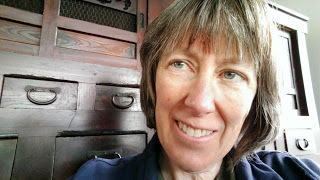 Pam grew up in Montreal. A geologist by training, Pam taught everything from preschool to science pedagogy for thirty years. She practices timed writing with two Seattle groups. With Arleen Williams, she founded
No Talking Dogs Press
which puts out short books in easy English for immigrants. She is writing a novel.
Pam grew up in Montreal. A geologist by training, Pam taught everything from preschool to science pedagogy for thirty years. She practices timed writing with two Seattle groups. With Arleen Williams, she founded
No Talking Dogs Press
which puts out short books in easy English for immigrants. She is writing a novel.
Published on February 15, 2016 18:45
Author Interview - Part II
Scroll Down for Part I
What impact does your timed writing practice (with two different groups in Seattle) have on your writing?Timed writing practice is the opposite of writer’s block. Writing to the clock, allowing the writing to be ugly and/or raw, and writing with company keeps my pen moving and words falling onto the page. If ever I’m feeling stuck, I know to give myself a time-frame, to sit, and to write until the alarm sounds. Practicing timed writing keeps me optimistic. Practicing timed writing with a group transforms my solo activity into a social one and has given me community.
What are you working on now? I’m working on a novel about color, art, and creativity. My novel’s heroine protects art and color in her beige-dominated world where Color Rules restrict. It’s a mess and it’s going to take me a long time to arrive at a first draft, and I’m having a blast.
The poem I’m wrestling with is “All Lines Dissolve” which features a goddess and waiting.
And I’m hoping for a couple of play readings this year.
Final Words of WisdomWisdom is a big ask! Are final words of randomness okay? (Elena says, YES!)
When I’m scared or too serious, I remind myself:No one is making me write. I do this because it is a good time. I can make it anything I can imagine, and I can imagine much. (Elena says, those are very wise final words.)
What impact does your timed writing practice (with two different groups in Seattle) have on your writing?Timed writing practice is the opposite of writer’s block. Writing to the clock, allowing the writing to be ugly and/or raw, and writing with company keeps my pen moving and words falling onto the page. If ever I’m feeling stuck, I know to give myself a time-frame, to sit, and to write until the alarm sounds. Practicing timed writing keeps me optimistic. Practicing timed writing with a group transforms my solo activity into a social one and has given me community.
What are you working on now? I’m working on a novel about color, art, and creativity. My novel’s heroine protects art and color in her beige-dominated world where Color Rules restrict. It’s a mess and it’s going to take me a long time to arrive at a first draft, and I’m having a blast.
The poem I’m wrestling with is “All Lines Dissolve” which features a goddess and waiting.
And I’m hoping for a couple of play readings this year.
Final Words of WisdomWisdom is a big ask! Are final words of randomness okay? (Elena says, YES!)
When I’m scared or too serious, I remind myself:No one is making me write. I do this because it is a good time. I can make it anything I can imagine, and I can imagine much. (Elena says, those are very wise final words.)
Published on February 15, 2016 18:43
February 3, 2016
Author, Playwright ... Geologist!
You wrote a series of short books for Adults learning English. How did you get started with the series? What was the process of working with Arleen Williams?
I wrote The Old House on South Sixteenth Street because my friend, Arleen,couldn’t find the texts she wanted for her ESL classes. The Old House … features adult characters with adult problems in picture-book-easy English. It was really fun to write with the constraint of keeping the language simple, so I wrote two sequels and a second series. Meanwhile, Arleen wrote a series of stories centered on American holidays, explaining many of their oddities. We each wrote six stories. We wrote the drafts independently, then read and edited them aloud, together, so they became joint-efforts. Our process involved lots of cups of tea, dozens of brownies, and pounds of walnuts and almonds. In 2015 we published them under the imprint NoTalking Dogs Press .
How does working as a playwright differ from working as a novelist?
I am finding I do a few of the same things whether writing plays or my current novel. I plunk down some stuff, then I sort out actions on index cards and churn out scene lists and diagrams—a repeating cycle of seat-of-the-pants generating of stuff followed by organizing stints. I think of what a drawing teacher in college told me, “Don’t erase the wrong line until you’ve drawn the right line.” I like to have material on the page which I can erase or embellish.I shuffle the material a lot. My current novel has had a slew of different openings and I haven’t even roughed in a first draft yet.
When I’m writing a script, I hear voices. But they’re useful, so please don’t call in the white coats yet. I read aloud if I’m not hearing them. Before writing their speeches I prepare the script by alternating, or otherwise intermixing, my characters’ names. Sometimes I have to delete these, but sometimes having the character’s name waiting ahead of me makes me come up with how that figment of my imagination would respond to the last remark.
I am lucky to have a wonderful playwriting critique group. We read each other’s scripts aloud so the playwright can listen, and we discuss. I depend on their suggestions to rewrite. I am extra lucky if a group of actors reads my script and I get feedback from them and any audience. From one “mean” reading by an excellent actor, I realized I needed to rewrite her character. I gave her character a softer lexicon so she could not be interpreted as a mean character in the future. Plays become group projects. When my plays have been produced, I’ve been fascinated to see how the director and actors make something new, which may not resemble what I initially imagined.
I broke off from the novel I’m working on to write a one-act comedy last fall. The playwriting buzzed along in a way that the novel-writing had not. The form of a play, as speech-and-response, action-reaction-reaction …, feels natural to me. Now that I’m writing a novel, I have all those other aspects of scene-writing, such as descriptions of person, action, location, thought, and emotion to contend with. Readers of my first section urge me to flesh these out more than I have. Most of all, I have the greater length to contend with. I need bigger stretches of time and longer focus.
So, the biggest difference may involve pace. I’m finding it’s okay to move slowly in writing the novel. I’m learning to take my time and not rush. A novel is big. It’s a lot to figure out and make sense of, but the schedule is wholly my own. This novel will take much longer than a play!
How does your training as a geologist impact your approach to writing?
I am a scientist at heart. My training in geology gives me an experimental approach. If something doesn’t fly, I change it, and send it off again. I love collecting and tracking data, as in, how many times I submit in a year, how many of those are rejections, and so forth. (Last year a poem I had submitted twenty times was published.) I’ve written plays with science content—one thought experiment for Infinity Box Theatre Project about robots, The Robot Decision, and two featuring the endangered parrot, the kakapo. Geological content crops up in a few of my poems.
Check Back Feb 15th for Part II!
I wrote The Old House on South Sixteenth Street because my friend, Arleen,couldn’t find the texts she wanted for her ESL classes. The Old House … features adult characters with adult problems in picture-book-easy English. It was really fun to write with the constraint of keeping the language simple, so I wrote two sequels and a second series. Meanwhile, Arleen wrote a series of stories centered on American holidays, explaining many of their oddities. We each wrote six stories. We wrote the drafts independently, then read and edited them aloud, together, so they became joint-efforts. Our process involved lots of cups of tea, dozens of brownies, and pounds of walnuts and almonds. In 2015 we published them under the imprint NoTalking Dogs Press .
How does working as a playwright differ from working as a novelist?
I am finding I do a few of the same things whether writing plays or my current novel. I plunk down some stuff, then I sort out actions on index cards and churn out scene lists and diagrams—a repeating cycle of seat-of-the-pants generating of stuff followed by organizing stints. I think of what a drawing teacher in college told me, “Don’t erase the wrong line until you’ve drawn the right line.” I like to have material on the page which I can erase or embellish.I shuffle the material a lot. My current novel has had a slew of different openings and I haven’t even roughed in a first draft yet.
When I’m writing a script, I hear voices. But they’re useful, so please don’t call in the white coats yet. I read aloud if I’m not hearing them. Before writing their speeches I prepare the script by alternating, or otherwise intermixing, my characters’ names. Sometimes I have to delete these, but sometimes having the character’s name waiting ahead of me makes me come up with how that figment of my imagination would respond to the last remark.
I am lucky to have a wonderful playwriting critique group. We read each other’s scripts aloud so the playwright can listen, and we discuss. I depend on their suggestions to rewrite. I am extra lucky if a group of actors reads my script and I get feedback from them and any audience. From one “mean” reading by an excellent actor, I realized I needed to rewrite her character. I gave her character a softer lexicon so she could not be interpreted as a mean character in the future. Plays become group projects. When my plays have been produced, I’ve been fascinated to see how the director and actors make something new, which may not resemble what I initially imagined.
I broke off from the novel I’m working on to write a one-act comedy last fall. The playwriting buzzed along in a way that the novel-writing had not. The form of a play, as speech-and-response, action-reaction-reaction …, feels natural to me. Now that I’m writing a novel, I have all those other aspects of scene-writing, such as descriptions of person, action, location, thought, and emotion to contend with. Readers of my first section urge me to flesh these out more than I have. Most of all, I have the greater length to contend with. I need bigger stretches of time and longer focus.
So, the biggest difference may involve pace. I’m finding it’s okay to move slowly in writing the novel. I’m learning to take my time and not rush. A novel is big. It’s a lot to figure out and make sense of, but the schedule is wholly my own. This novel will take much longer than a play!
How does your training as a geologist impact your approach to writing?
I am a scientist at heart. My training in geology gives me an experimental approach. If something doesn’t fly, I change it, and send it off again. I love collecting and tracking data, as in, how many times I submit in a year, how many of those are rejections, and so forth. (Last year a poem I had submitted twenty times was published.) I’ve written plays with science content—one thought experiment for Infinity Box Theatre Project about robots, The Robot Decision, and two featuring the endangered parrot, the kakapo. Geological content crops up in a few of my poems.
Check Back Feb 15th for Part II!
Published on February 03, 2016 20:27
January 4, 2016
New Mysteries ... New Thrillers!
I thought I'd start off 2016 by introducing as many Debut Authors in International Thriller Writers as I can post in the month of January.
As a member of the Debut Authors Program with One Dead, Two to Go , I'm excited to learn a little bit more about my fellow debut writers....
Check back daily for new authors!
As a member of the Debut Authors Program with One Dead, Two to Go , I'm excited to learn a little bit more about my fellow debut writers....
Check back daily for new authors!
Published on January 04, 2016 22:03
Debut Authors 2016
Authors are all part of the 2015/2016 Debut Author's Program in
International Thriller Writers
The Question: What are you most looking forward to as a debut author in 2016?
______________________________________________
I've already achieved my first goal, which is to see my book next to my son's book (Neighborhood Heroes: Life Lessons Learned from Maine's Greatest Generation) and my father's many books. Three generations of authors is pretty cool.
Next goal: world domination or the Green Bay Packers winning the Super Bowl, either one.--Brendan Rielly, author of An Unbeaten Man
(As a Seahawks fan, I share Brendan's pain on this one, at least about the Packers, I don't have the energy for world domination!--Elena)
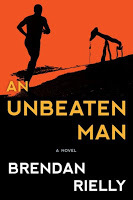 Abandoned by his father, orphaned by his drug-addled mother, and devastated by the murder of his sister, Michael McKeon was once a hardened “street dog who learned to play in traffic.” Years later, Michael is now a Bowdoin College professor with a wife and adopted daughter. When he creates a microbe that instantly cleans up any oil spill, no matter how large, by devouring the oil, that discovery should be the breakthrough that defines a career.
Abandoned by his father, orphaned by his drug-addled mother, and devastated by the murder of his sister, Michael McKeon was once a hardened “street dog who learned to play in traffic.” Years later, Michael is now a Bowdoin College professor with a wife and adopted daughter. When he creates a microbe that instantly cleans up any oil spill, no matter how large, by devouring the oil, that discovery should be the breakthrough that defines a career.
But the microbiologist's life is ruined when The Global Group kidnaps his wife and daughter, forcing him to use his microbe to destroy all Saudi and Russian oil. As Michael races against the clock to save his family, he becomes a threat to the secret efforts of the American, Russian and Saudi governments to douse the flames in the Middle East by implementing a new Marshall Plan.
______________________________________________
I look forward to connecting with readers of all ages. My book is YA, so I wrote it with the teen reader in mind. But people of all ages read YA these days (including me!) I've also had a blast connecting with other authors at conferences. I have a few more conferences in my lineup this year, including Thriller Fest. I am REALLY looking forward to that!--Nina Mansfield, author of Swimming Alone
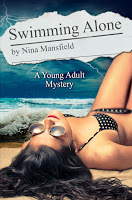 The Sea Side Strangler is on the loose in Beach Point, where fifteen-year-old Cathy Banks is spending the summer with her aunt (who happens to be mystery writer Roberta McCabe.) Although thrilled to be away from her psychotic, divorcing parents, with no cell phone or internet access, Cathy is positive that her summer is going to be wretched.
The Sea Side Strangler is on the loose in Beach Point, where fifteen-year-old Cathy Banks is spending the summer with her aunt (who happens to be mystery writer Roberta McCabe.) Although thrilled to be away from her psychotic, divorcing parents, with no cell phone or internet access, Cathy is positive that her summer is going to be wretched.
Just when she begins to make friends, and even finds a crush to drool over, her new friend Lauren vanishes. When a body surfaces in Beach Point Bay, Cathy is forced to face the question: has the Sea Side Strangler struck again?
______________________________________________
After several frantic months of book launch preparation, I’m really looking forward to connecting with readers in 2016. It makes me so happy when someone lets me know their thoughts about my book, and I’m eager to have lots of conversations with readers. I’m also looking forward to finding the time to work on my next novel.--Emily Ross, author of the YA thriller Half in Love with Death
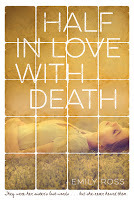 It's the era of peace and love in the 1960s, but nothing is peaceful in Caroline's life. Since her beautiful older sister Jess disappeared, fifteen-year-old Caroline might as well have disappeared too. She's invisible to her parents, who can't stop blaming each other. The police keep following up on leads even Caroline knows are foolish. The only one who seems to care about her is Tony, her sister's older boyfriend, who soothes Caroline's desperate heart every time he turns his magical blue eyes on her.
It's the era of peace and love in the 1960s, but nothing is peaceful in Caroline's life. Since her beautiful older sister Jess disappeared, fifteen-year-old Caroline might as well have disappeared too. She's invisible to her parents, who can't stop blaming each other. The police keep following up on leads even Caroline knows are foolish. The only one who seems to care about her is Tony, her sister's older boyfriend, who soothes Caroline's desperate heart every time he turns his magical blue eyes on her.
Tony is convinced that the answer to Jess's disappearance is in California, the land of endless summer, among the runaways and flower children. Come with me, Tony says to Caroline, and we'll find her together. Tony is so loving, and all he cares about is bringing Jess home. And so Caroline follows, and closes a door behind her that may never open again, in a heartfelt thriller that never lets up.
"Half in Love with Death ... pulls you in with its beautiful prose, only to set you up for a thriller so true to life it will make you question how well you truly know your neighbors.” – Hypable
______________________________________________
I look forward to meeting more fans of my first novel. I write for them. It's a surreal experience to hear such enthusiasm over my work and it inspires me to write better and hopefully faster (snort). Book 2 is already done and I'm plotting book 3 in the series. Thank you, readers!
--DB Kennison, author of Still Life
Randi Lassiter, is twenty-nine, divorced, and remarkably content with her non-existent social life until the night she stumbles on a mutilated body. As she enters the investigation, first as a suspect then as amateur sleuth, can she stand up to the arrogant detective in charge and do what’s necessary to solve the murder of a young woman?
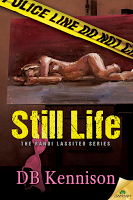 Not much happens in the microscopic town of Mt. Ouisco, Wisconsin. That’s what former Milwaukee homicide cop, Detective Jon Bricksen, counted on when he took a job at the local police department. But with the first murder the town has seen in forty years, he realizes his chance to escape the violence of the big city will have to wait.
Not much happens in the microscopic town of Mt. Ouisco, Wisconsin. That’s what former Milwaukee homicide cop, Detective Jon Bricksen, counted on when he took a job at the local police department. But with the first murder the town has seen in forty years, he realizes his chance to escape the violence of the big city will have to wait.
As Randi uses the small town network to make critical progress before the officials can, Detective Bricksen is forced into an alliance with her. Can the combative pair fight attraction as they enter a dangerous world of disturbing performance art where murder is on display? What neither of them knows is the homicide they’re working is part of something much larger. Can they solve the mystery before one of them becomes a killer’s target?
______________________________________________
Walking into a bookstore and seeing my book on the shelf. I’ve been dreaming of that moment nearly my entire life.—Nadine Nettmann, author of Decanting a Murder
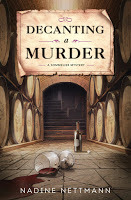 Katie Stillwell focuses on two things in her life: work and practicing for her Sommelier Certification with her blind tasting group. The exam was supposed to be the hardest part of her week, but that was before a body was found at an exclusive Napa Valley winery party. When all the evidence points to Katie’s best friend, the outspoken and independent Tessa, Katie drops everything to clear Tessa’s name. Using her deductive wine skills, she tries to track down the real killer. But when repeated attempts are made on her life, Katie discovers that everyone’s secrets must be uncorked — including her own.
Katie Stillwell focuses on two things in her life: work and practicing for her Sommelier Certification with her blind tasting group. The exam was supposed to be the hardest part of her week, but that was before a body was found at an exclusive Napa Valley winery party. When all the evidence points to Katie’s best friend, the outspoken and independent Tessa, Katie drops everything to clear Tessa’s name. Using her deductive wine skills, she tries to track down the real killer. But when repeated attempts are made on her life, Katie discovers that everyone’s secrets must be uncorked — including her own.
______________________________________________
Meeting readers, of course! And I'm really looking forward to the opportunity to connect with other ITW authors at Thrillerfest XI in July, and also to participate on a panel for the Palm Beach Peril event in Lake Worth, FL on January 29th. I'm super excited to meet the headliner for the event, author extraordinaire, Scott Turow.
On a more personal level, I'm looking forward to slowing down now that the whirlwind of my debut launch has settled and spending more time with my husband and kiddos. And I'll be diving into edits on my second novel.--Karen Katchur, author of The Secrets of Lake Road
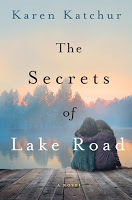 Jo has been hiding the truth about her role in her high school boyfriend's drowning for sixteen years. Every summer, she drops her children off with her mother at the lakeside community where she spent summers growing up, but cannot bear to stay herself; everything about the lake reminds her of the guilt she feels. For her daughter Caroline, however, the lake is a precious world apart; its familiarity and sameness comforts her every year despite the changes in her life outside its bounds. At twelve years old and caught between childhood and adolescence, she longs to win her mother's love and doesn't understand why Jo keeps running away.
Jo has been hiding the truth about her role in her high school boyfriend's drowning for sixteen years. Every summer, she drops her children off with her mother at the lakeside community where she spent summers growing up, but cannot bear to stay herself; everything about the lake reminds her of the guilt she feels. For her daughter Caroline, however, the lake is a precious world apart; its familiarity and sameness comforts her every year despite the changes in her life outside its bounds. At twelve years old and caught between childhood and adolescence, she longs to win her mother's love and doesn't understand why Jo keeps running away.
Then seven-year-old Sara Starr goes missing from the community beach. Rescue workers fail to uncover any sign of her--but instead dredge up the bones Jo hoped would never be discovered, shattering the quiet lakeside community's tranquility. Caroline was one of the last people to see Sara alive on the beach, and feels responsible for her disappearance. She takes it upon herself to figure out what happened to the little girl. As Caroline searches for Sara, she uncovers the secrets her mother has been hiding, unraveling the very foundation of everything she knows about herself and her family.
The Secrets of Lake Road by Karen Katchur is a riveting novel that is impossible to put down and hard to forget.
______________________________________________
Writing a novel is such a solitary undertaking; I spent most of last year indoors, writing, rewriting and polishing my book. I’m excited about getting out and talking to readers and other writers. Also, Mission Hill is part of a three book series and I’m looking forward to finishing the second book.
--Pamela Wechsler, author
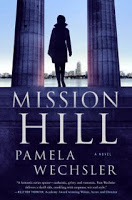 Abby Endicott is chief of the District Attorney's homicide unit in Boston, where she investigates and prosecutes the city's most dangerous killers. She attended the elite Winsor school, graduated from Harvard Law School, and has been known to change into an evening gown amidst bodies in the morgue. She loves her job, and is committed to it. But among Abby's many secrets is her longtime affair with fellow prosecutor Tim Mooney, a married father of one.One night, Abby is awakened very late by a phone call from her favorite detective, who reports that there has been a horrific murder but is vague about the specifics. When she arrives at the crime scene and discovers the identity of the victim, she knows the terror and tragedy are only beginning.
Abby Endicott is chief of the District Attorney's homicide unit in Boston, where she investigates and prosecutes the city's most dangerous killers. She attended the elite Winsor school, graduated from Harvard Law School, and has been known to change into an evening gown amidst bodies in the morgue. She loves her job, and is committed to it. But among Abby's many secrets is her longtime affair with fellow prosecutor Tim Mooney, a married father of one.One night, Abby is awakened very late by a phone call from her favorite detective, who reports that there has been a horrific murder but is vague about the specifics. When she arrives at the crime scene and discovers the identity of the victim, she knows the terror and tragedy are only beginning.
Debut novelist Pamela Wechsler delivers a gripping and very human portrayal of a woman who will stop at nothing to find out the truth, even if it challenges everything she believes about justice.
“A fantastic series opener―authentic, gritty and romantic. Pam Wechsler delivers a thrill ride, crackling with suspense, wit and style.” ―Billy Bob Thornton, Academy Award winning writer, actor, and director
______________________________________________
Attending conferences as a published author. I was once one of those in the audience who was searching for a way forward in this crazy business, but have since found my way.
--Tim Washburn, author of Powerless
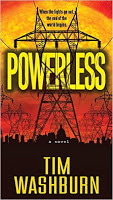 Nothing Can Prepare You. . .
Nothing Can Prepare You. . .
It strikes without warning. A massive geomagnetic solar storm that destroys every power grid in the northern hemisphere. North America is without lights, electricity, phones, and navigation systems.
In one week, the human race is flung back to the Dark Ages.
______________________________________________
It's tough to choose one thing! But if I must, I think interacting with new readers would be at the top of my list. Meeting people who have taken the time to read my novel is heartening, thrilling and humbling. I love to answer their questions and to hear what about Nation of Enemies resonated with them, what kept them turning the page and what made them root for a character. I may have written a thriller, but this is the thrilling part for me.
--Holly Raynes, author
Turned away at London Heathrow Immigration because of his wife’s and unborn baby’s inferior DNA, Dr. Cole Fitzgerald returns to work in Boston’s Mass General hospital. He purchases ballistics skins for his wife and son, as well as himself, a bulletproof car and a pre-fab house in a Safe District. His family’s safety is paramount: with the War at Home, there are never enough precautions.
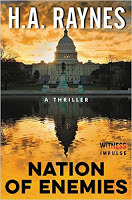 It is 2032. Legions of lone wolves and militias have struck fiercely since The Day the Planes Fell. For the ten years since that colossal attack, Cole has treated survivors of the terror in the ER. But his oath to Do No Harm gnaws at him as he updates the biochips that, by law, every citizen must wear. If their numbers dip below the “clean” benchmark of 75, he’s condemning them to a life without employment, without a home, a life of eternal struggle. After he loses another loved one in an attack, a seed of revolt is planted in Cole and he begins an underground revolution to restore civil liberties and wipe away the inequity of biology. Along the way he’ll risk his family, his career and his life when he discovers the U.S. government may pose a greater threat than the terrorists themselves
It is 2032. Legions of lone wolves and militias have struck fiercely since The Day the Planes Fell. For the ten years since that colossal attack, Cole has treated survivors of the terror in the ER. But his oath to Do No Harm gnaws at him as he updates the biochips that, by law, every citizen must wear. If their numbers dip below the “clean” benchmark of 75, he’s condemning them to a life without employment, without a home, a life of eternal struggle. After he loses another loved one in an attack, a seed of revolt is planted in Cole and he begins an underground revolution to restore civil liberties and wipe away the inequity of biology. Along the way he’ll risk his family, his career and his life when he discovers the U.S. government may pose a greater threat than the terrorists themselves
______________________________________________
As a former broadcaster with Sirius XM Book Radio, I spent many hours with microphone in hand interviewing Thrillerfest attendees, and of course that included Debut Authors! I'm sort of beside myself that I get to be one of them this year.--Kim Alexander, author of The Sand Prince
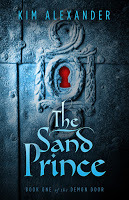 Two worlds: On the war-ravaged demon world of Eriis, Hellne, the fierce young queen, fights to keep her people alive. On the green and gentle human world of Mistra, the demons have faded into myth. Only a handful of old men and children still guard The Door between the worlds.
Two worlds: On the war-ravaged demon world of Eriis, Hellne, the fierce young queen, fights to keep her people alive. On the green and gentle human world of Mistra, the demons have faded into myth. Only a handful of old men and children still guard The Door between the worlds.
Bound by magic: Rhuun, the Prince of Eriis, uncovers a sultry book written by a human, sparking an obsession with the other world. When he is forced to flee Eriis he must escape through The Door or pay the price in blood.
Divided by a door: The humans of Mistra are not what Rhuun was expecting—and one insufferable young woman in particular is about to find out that the demons of Eriis are not mythological after all...
"In Kim Alexander’s debut novel she weaves a witty, epic fantasy brimming with diverse characters and plenty of intrigue."
______________________________________________
Getting to meet my readers!
--K. L. Hallam, author of The Unmoving Sky
The Unmoving Sky: There is nothing darker than the woods until you meet your worst fear. Jackson Bower has a lot on his mind lately. His younger brother hasn’t been the same since his mother’s death. His father’s drinking is out of control. Then there’s Jackson’s girlfriend and the grief that ties them together even as it threatens to drive them apart.
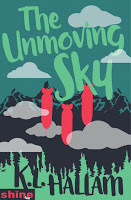 He distances himself, hoping for a little perspective at the family lodge. But when their father gets drunk and dangerous, he and his brother escape into the woods.Night creeps in, and the rains come fast. Artie slips down a ravine. He’s wounded and the brothers seek shelter in a cave, only to find someone else already taking refuge there.A desperate man with plans to destroy their town.
He distances himself, hoping for a little perspective at the family lodge. But when their father gets drunk and dangerous, he and his brother escape into the woods.Night creeps in, and the rains come fast. Artie slips down a ravine. He’s wounded and the brothers seek shelter in a cave, only to find someone else already taking refuge there.A desperate man with plans to destroy their town.
Jackson must get him and his wounded brother out of the cave and over the mountain to warn everyone in time. Without getting them both killed first.
Check back Jan 25th for the cover reveal!
______________________________________________
It's such a hoot to walk into a bookstore and see To Brew Or Not To Brew on the shelf, so it's kind of hard to beat that. I'm looking forward to seeing and hearing readers reactions to the book. The variations of what people like and what they don't like is really interesting to me. And I'm really looking forward to attending Malice Domestic as a published author. It will be so much fun! And of course, I'm looking forward to the second book in the series (Tangled Up In Brew) coming out in October.
--Joyce Tremel
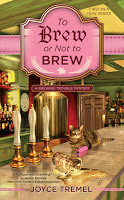
The Allegheny Brew House is a dream come true for Maxine “Max” O’Hara, who went all the way to Germany for her brewmaster certification, and is now preparing to open her own craft brew pub in a newly revitalized section of Pittsburgh. But before she can start pouring stouts and lagers to thirsty throngs, there’s trouble on tap. Suspicious acts of sabotage culminate in Max finding her assistant brewmaster and chef Kurt Schmidt strangled in one of the vats.
Between rescuing a stray gray tabby she names Hops and considering a handsome ex hockey player as her new chef, Max doesn’t have a lot of time to solve a murder. But with a homicide detective for a dad, she comes to criminal investigation naturally. And if someone is desperate enough to kill to stop her from opening, Max needs to act fast—before her brand-new brew biz totally tanks...
Nominated for the 2015 Reviewers' Choice Award
for best amateur sleuth by RT Book Reviews!
______________________________________________
Meeting people actually reading all these words I've written...-- J. Todd Scott, author of The Big Empty
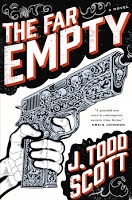 Seventeen-year-old Caleb Ross is adrift in the wake of the sudden disappearance of his mother more than a year ago, and is struggling to find his way out of the small Texas border town of Murfee. Chris Cherry is a newly minted sheriff’s deputy, a high school football hero who has reluctantly returned to his hometown. When skeletal remains are discovered in the surrounding badlands, the two are inexorably drawn together as their efforts to uncover Murfee’s darkest secrets lead them to the same terrifying suspect: Caleb’s father and Chris’s boss, the charismatic and feared Sheriff Standford “Judge” Ross. Dark, elegiac, and violent, THE FAR EMPTY is a modern Western, a story of loss and escape set along the sharp edge of the Texas border. Told by a longtime federal agent who knows the region, it’s a debut novel you won’t soon forget.
Seventeen-year-old Caleb Ross is adrift in the wake of the sudden disappearance of his mother more than a year ago, and is struggling to find his way out of the small Texas border town of Murfee. Chris Cherry is a newly minted sheriff’s deputy, a high school football hero who has reluctantly returned to his hometown. When skeletal remains are discovered in the surrounding badlands, the two are inexorably drawn together as their efforts to uncover Murfee’s darkest secrets lead them to the same terrifying suspect: Caleb’s father and Chris’s boss, the charismatic and feared Sheriff Standford “Judge” Ross. Dark, elegiac, and violent, THE FAR EMPTY is a modern Western, a story of loss and escape set along the sharp edge of the Texas border. Told by a longtime federal agent who knows the region, it’s a debut novel you won’t soon forget.
“J. Todd Scott’s The Far Empty is so good I wish I’d written it. The poetic and bloody ground of west Texas has given birth to a powerful new voice in contemporary western crime fiction.” —Craig Johnson, New York Times–bestselling author of the Walt Longmire series______________________________________________
I'm most looking forward to seeing what happens to my baby debut as it releases in foreign markets.
-- Shannon Kirk, author of the award winning Method 15/33
Imagine a helpless, pregnant 16-year-old who's just been yanked from the serenity of her home and shoved in a dirty van. Kidnapped. Alone. Terrified. Now forget her.
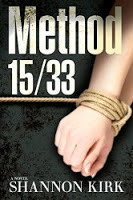 Picture instead a pregnant, 16-year-old, manipulative prodigy. She is shoved in a dirty van and, from the first moment of her kidnapping, feels a calm desire for two things: to save her unborn son and to exact merciless revenge.She is methodical. She is calculating, scientific in her plotting. She might be a clinical sociopath. Method 15/33 is what happens when the victim is just as cold as the captors.Accolades: School Library Journal Best Adult Books for Teens List, Winner: 2015 National Indie Excellence Award for Suspense, Finalist: Best New Fiction, USA Best Book Award, 2013 Finalist in the William Faulkner-William Wisdom Creative Writing Competition.
Picture instead a pregnant, 16-year-old, manipulative prodigy. She is shoved in a dirty van and, from the first moment of her kidnapping, feels a calm desire for two things: to save her unborn son and to exact merciless revenge.She is methodical. She is calculating, scientific in her plotting. She might be a clinical sociopath. Method 15/33 is what happens when the victim is just as cold as the captors.Accolades: School Library Journal Best Adult Books for Teens List, Winner: 2015 National Indie Excellence Award for Suspense, Finalist: Best New Fiction, USA Best Book Award, 2013 Finalist in the William Faulkner-William Wisdom Creative Writing Competition.
International Thriller Writers
The Question: What are you most looking forward to as a debut author in 2016?
______________________________________________
I've already achieved my first goal, which is to see my book next to my son's book (Neighborhood Heroes: Life Lessons Learned from Maine's Greatest Generation) and my father's many books. Three generations of authors is pretty cool.
Next goal: world domination or the Green Bay Packers winning the Super Bowl, either one.--Brendan Rielly, author of An Unbeaten Man
(As a Seahawks fan, I share Brendan's pain on this one, at least about the Packers, I don't have the energy for world domination!--Elena)
 Abandoned by his father, orphaned by his drug-addled mother, and devastated by the murder of his sister, Michael McKeon was once a hardened “street dog who learned to play in traffic.” Years later, Michael is now a Bowdoin College professor with a wife and adopted daughter. When he creates a microbe that instantly cleans up any oil spill, no matter how large, by devouring the oil, that discovery should be the breakthrough that defines a career.
Abandoned by his father, orphaned by his drug-addled mother, and devastated by the murder of his sister, Michael McKeon was once a hardened “street dog who learned to play in traffic.” Years later, Michael is now a Bowdoin College professor with a wife and adopted daughter. When he creates a microbe that instantly cleans up any oil spill, no matter how large, by devouring the oil, that discovery should be the breakthrough that defines a career.But the microbiologist's life is ruined when The Global Group kidnaps his wife and daughter, forcing him to use his microbe to destroy all Saudi and Russian oil. As Michael races against the clock to save his family, he becomes a threat to the secret efforts of the American, Russian and Saudi governments to douse the flames in the Middle East by implementing a new Marshall Plan.
______________________________________________
I look forward to connecting with readers of all ages. My book is YA, so I wrote it with the teen reader in mind. But people of all ages read YA these days (including me!) I've also had a blast connecting with other authors at conferences. I have a few more conferences in my lineup this year, including Thriller Fest. I am REALLY looking forward to that!--Nina Mansfield, author of Swimming Alone
 The Sea Side Strangler is on the loose in Beach Point, where fifteen-year-old Cathy Banks is spending the summer with her aunt (who happens to be mystery writer Roberta McCabe.) Although thrilled to be away from her psychotic, divorcing parents, with no cell phone or internet access, Cathy is positive that her summer is going to be wretched.
The Sea Side Strangler is on the loose in Beach Point, where fifteen-year-old Cathy Banks is spending the summer with her aunt (who happens to be mystery writer Roberta McCabe.) Although thrilled to be away from her psychotic, divorcing parents, with no cell phone or internet access, Cathy is positive that her summer is going to be wretched. Just when she begins to make friends, and even finds a crush to drool over, her new friend Lauren vanishes. When a body surfaces in Beach Point Bay, Cathy is forced to face the question: has the Sea Side Strangler struck again?
______________________________________________
After several frantic months of book launch preparation, I’m really looking forward to connecting with readers in 2016. It makes me so happy when someone lets me know their thoughts about my book, and I’m eager to have lots of conversations with readers. I’m also looking forward to finding the time to work on my next novel.--Emily Ross, author of the YA thriller Half in Love with Death
 It's the era of peace and love in the 1960s, but nothing is peaceful in Caroline's life. Since her beautiful older sister Jess disappeared, fifteen-year-old Caroline might as well have disappeared too. She's invisible to her parents, who can't stop blaming each other. The police keep following up on leads even Caroline knows are foolish. The only one who seems to care about her is Tony, her sister's older boyfriend, who soothes Caroline's desperate heart every time he turns his magical blue eyes on her.
It's the era of peace and love in the 1960s, but nothing is peaceful in Caroline's life. Since her beautiful older sister Jess disappeared, fifteen-year-old Caroline might as well have disappeared too. She's invisible to her parents, who can't stop blaming each other. The police keep following up on leads even Caroline knows are foolish. The only one who seems to care about her is Tony, her sister's older boyfriend, who soothes Caroline's desperate heart every time he turns his magical blue eyes on her. Tony is convinced that the answer to Jess's disappearance is in California, the land of endless summer, among the runaways and flower children. Come with me, Tony says to Caroline, and we'll find her together. Tony is so loving, and all he cares about is bringing Jess home. And so Caroline follows, and closes a door behind her that may never open again, in a heartfelt thriller that never lets up.
"Half in Love with Death ... pulls you in with its beautiful prose, only to set you up for a thriller so true to life it will make you question how well you truly know your neighbors.” – Hypable
______________________________________________
I look forward to meeting more fans of my first novel. I write for them. It's a surreal experience to hear such enthusiasm over my work and it inspires me to write better and hopefully faster (snort). Book 2 is already done and I'm plotting book 3 in the series. Thank you, readers!
--DB Kennison, author of Still Life
Randi Lassiter, is twenty-nine, divorced, and remarkably content with her non-existent social life until the night she stumbles on a mutilated body. As she enters the investigation, first as a suspect then as amateur sleuth, can she stand up to the arrogant detective in charge and do what’s necessary to solve the murder of a young woman?
 Not much happens in the microscopic town of Mt. Ouisco, Wisconsin. That’s what former Milwaukee homicide cop, Detective Jon Bricksen, counted on when he took a job at the local police department. But with the first murder the town has seen in forty years, he realizes his chance to escape the violence of the big city will have to wait.
Not much happens in the microscopic town of Mt. Ouisco, Wisconsin. That’s what former Milwaukee homicide cop, Detective Jon Bricksen, counted on when he took a job at the local police department. But with the first murder the town has seen in forty years, he realizes his chance to escape the violence of the big city will have to wait. As Randi uses the small town network to make critical progress before the officials can, Detective Bricksen is forced into an alliance with her. Can the combative pair fight attraction as they enter a dangerous world of disturbing performance art where murder is on display? What neither of them knows is the homicide they’re working is part of something much larger. Can they solve the mystery before one of them becomes a killer’s target?
______________________________________________
Walking into a bookstore and seeing my book on the shelf. I’ve been dreaming of that moment nearly my entire life.—Nadine Nettmann, author of Decanting a Murder
 Katie Stillwell focuses on two things in her life: work and practicing for her Sommelier Certification with her blind tasting group. The exam was supposed to be the hardest part of her week, but that was before a body was found at an exclusive Napa Valley winery party. When all the evidence points to Katie’s best friend, the outspoken and independent Tessa, Katie drops everything to clear Tessa’s name. Using her deductive wine skills, she tries to track down the real killer. But when repeated attempts are made on her life, Katie discovers that everyone’s secrets must be uncorked — including her own.
Katie Stillwell focuses on two things in her life: work and practicing for her Sommelier Certification with her blind tasting group. The exam was supposed to be the hardest part of her week, but that was before a body was found at an exclusive Napa Valley winery party. When all the evidence points to Katie’s best friend, the outspoken and independent Tessa, Katie drops everything to clear Tessa’s name. Using her deductive wine skills, she tries to track down the real killer. But when repeated attempts are made on her life, Katie discovers that everyone’s secrets must be uncorked — including her own.______________________________________________
Meeting readers, of course! And I'm really looking forward to the opportunity to connect with other ITW authors at Thrillerfest XI in July, and also to participate on a panel for the Palm Beach Peril event in Lake Worth, FL on January 29th. I'm super excited to meet the headliner for the event, author extraordinaire, Scott Turow.
On a more personal level, I'm looking forward to slowing down now that the whirlwind of my debut launch has settled and spending more time with my husband and kiddos. And I'll be diving into edits on my second novel.--Karen Katchur, author of The Secrets of Lake Road
 Jo has been hiding the truth about her role in her high school boyfriend's drowning for sixteen years. Every summer, she drops her children off with her mother at the lakeside community where she spent summers growing up, but cannot bear to stay herself; everything about the lake reminds her of the guilt she feels. For her daughter Caroline, however, the lake is a precious world apart; its familiarity and sameness comforts her every year despite the changes in her life outside its bounds. At twelve years old and caught between childhood and adolescence, she longs to win her mother's love and doesn't understand why Jo keeps running away.
Jo has been hiding the truth about her role in her high school boyfriend's drowning for sixteen years. Every summer, she drops her children off with her mother at the lakeside community where she spent summers growing up, but cannot bear to stay herself; everything about the lake reminds her of the guilt she feels. For her daughter Caroline, however, the lake is a precious world apart; its familiarity and sameness comforts her every year despite the changes in her life outside its bounds. At twelve years old and caught between childhood and adolescence, she longs to win her mother's love and doesn't understand why Jo keeps running away.Then seven-year-old Sara Starr goes missing from the community beach. Rescue workers fail to uncover any sign of her--but instead dredge up the bones Jo hoped would never be discovered, shattering the quiet lakeside community's tranquility. Caroline was one of the last people to see Sara alive on the beach, and feels responsible for her disappearance. She takes it upon herself to figure out what happened to the little girl. As Caroline searches for Sara, she uncovers the secrets her mother has been hiding, unraveling the very foundation of everything she knows about herself and her family.
The Secrets of Lake Road by Karen Katchur is a riveting novel that is impossible to put down and hard to forget.
______________________________________________
Writing a novel is such a solitary undertaking; I spent most of last year indoors, writing, rewriting and polishing my book. I’m excited about getting out and talking to readers and other writers. Also, Mission Hill is part of a three book series and I’m looking forward to finishing the second book.
--Pamela Wechsler, author
 Abby Endicott is chief of the District Attorney's homicide unit in Boston, where she investigates and prosecutes the city's most dangerous killers. She attended the elite Winsor school, graduated from Harvard Law School, and has been known to change into an evening gown amidst bodies in the morgue. She loves her job, and is committed to it. But among Abby's many secrets is her longtime affair with fellow prosecutor Tim Mooney, a married father of one.One night, Abby is awakened very late by a phone call from her favorite detective, who reports that there has been a horrific murder but is vague about the specifics. When she arrives at the crime scene and discovers the identity of the victim, she knows the terror and tragedy are only beginning.
Abby Endicott is chief of the District Attorney's homicide unit in Boston, where she investigates and prosecutes the city's most dangerous killers. She attended the elite Winsor school, graduated from Harvard Law School, and has been known to change into an evening gown amidst bodies in the morgue. She loves her job, and is committed to it. But among Abby's many secrets is her longtime affair with fellow prosecutor Tim Mooney, a married father of one.One night, Abby is awakened very late by a phone call from her favorite detective, who reports that there has been a horrific murder but is vague about the specifics. When she arrives at the crime scene and discovers the identity of the victim, she knows the terror and tragedy are only beginning.Debut novelist Pamela Wechsler delivers a gripping and very human portrayal of a woman who will stop at nothing to find out the truth, even if it challenges everything she believes about justice.
“A fantastic series opener―authentic, gritty and romantic. Pam Wechsler delivers a thrill ride, crackling with suspense, wit and style.” ―Billy Bob Thornton, Academy Award winning writer, actor, and director
______________________________________________
Attending conferences as a published author. I was once one of those in the audience who was searching for a way forward in this crazy business, but have since found my way.
--Tim Washburn, author of Powerless
 Nothing Can Prepare You. . .
Nothing Can Prepare You. . .It strikes without warning. A massive geomagnetic solar storm that destroys every power grid in the northern hemisphere. North America is without lights, electricity, phones, and navigation systems.
In one week, the human race is flung back to the Dark Ages.
______________________________________________
It's tough to choose one thing! But if I must, I think interacting with new readers would be at the top of my list. Meeting people who have taken the time to read my novel is heartening, thrilling and humbling. I love to answer their questions and to hear what about Nation of Enemies resonated with them, what kept them turning the page and what made them root for a character. I may have written a thriller, but this is the thrilling part for me.
--Holly Raynes, author
Turned away at London Heathrow Immigration because of his wife’s and unborn baby’s inferior DNA, Dr. Cole Fitzgerald returns to work in Boston’s Mass General hospital. He purchases ballistics skins for his wife and son, as well as himself, a bulletproof car and a pre-fab house in a Safe District. His family’s safety is paramount: with the War at Home, there are never enough precautions.
 It is 2032. Legions of lone wolves and militias have struck fiercely since The Day the Planes Fell. For the ten years since that colossal attack, Cole has treated survivors of the terror in the ER. But his oath to Do No Harm gnaws at him as he updates the biochips that, by law, every citizen must wear. If their numbers dip below the “clean” benchmark of 75, he’s condemning them to a life without employment, without a home, a life of eternal struggle. After he loses another loved one in an attack, a seed of revolt is planted in Cole and he begins an underground revolution to restore civil liberties and wipe away the inequity of biology. Along the way he’ll risk his family, his career and his life when he discovers the U.S. government may pose a greater threat than the terrorists themselves
It is 2032. Legions of lone wolves and militias have struck fiercely since The Day the Planes Fell. For the ten years since that colossal attack, Cole has treated survivors of the terror in the ER. But his oath to Do No Harm gnaws at him as he updates the biochips that, by law, every citizen must wear. If their numbers dip below the “clean” benchmark of 75, he’s condemning them to a life without employment, without a home, a life of eternal struggle. After he loses another loved one in an attack, a seed of revolt is planted in Cole and he begins an underground revolution to restore civil liberties and wipe away the inequity of biology. Along the way he’ll risk his family, his career and his life when he discovers the U.S. government may pose a greater threat than the terrorists themselves______________________________________________
As a former broadcaster with Sirius XM Book Radio, I spent many hours with microphone in hand interviewing Thrillerfest attendees, and of course that included Debut Authors! I'm sort of beside myself that I get to be one of them this year.--Kim Alexander, author of The Sand Prince
 Two worlds: On the war-ravaged demon world of Eriis, Hellne, the fierce young queen, fights to keep her people alive. On the green and gentle human world of Mistra, the demons have faded into myth. Only a handful of old men and children still guard The Door between the worlds.
Two worlds: On the war-ravaged demon world of Eriis, Hellne, the fierce young queen, fights to keep her people alive. On the green and gentle human world of Mistra, the demons have faded into myth. Only a handful of old men and children still guard The Door between the worlds.
Bound by magic: Rhuun, the Prince of Eriis, uncovers a sultry book written by a human, sparking an obsession with the other world. When he is forced to flee Eriis he must escape through The Door or pay the price in blood.
Divided by a door: The humans of Mistra are not what Rhuun was expecting—and one insufferable young woman in particular is about to find out that the demons of Eriis are not mythological after all...
"In Kim Alexander’s debut novel she weaves a witty, epic fantasy brimming with diverse characters and plenty of intrigue."
______________________________________________
Getting to meet my readers!
--K. L. Hallam, author of The Unmoving Sky
The Unmoving Sky: There is nothing darker than the woods until you meet your worst fear. Jackson Bower has a lot on his mind lately. His younger brother hasn’t been the same since his mother’s death. His father’s drinking is out of control. Then there’s Jackson’s girlfriend and the grief that ties them together even as it threatens to drive them apart.
 He distances himself, hoping for a little perspective at the family lodge. But when their father gets drunk and dangerous, he and his brother escape into the woods.Night creeps in, and the rains come fast. Artie slips down a ravine. He’s wounded and the brothers seek shelter in a cave, only to find someone else already taking refuge there.A desperate man with plans to destroy their town.
He distances himself, hoping for a little perspective at the family lodge. But when their father gets drunk and dangerous, he and his brother escape into the woods.Night creeps in, and the rains come fast. Artie slips down a ravine. He’s wounded and the brothers seek shelter in a cave, only to find someone else already taking refuge there.A desperate man with plans to destroy their town. Jackson must get him and his wounded brother out of the cave and over the mountain to warn everyone in time. Without getting them both killed first.
Check back Jan 25th for the cover reveal!
______________________________________________
It's such a hoot to walk into a bookstore and see To Brew Or Not To Brew on the shelf, so it's kind of hard to beat that. I'm looking forward to seeing and hearing readers reactions to the book. The variations of what people like and what they don't like is really interesting to me. And I'm really looking forward to attending Malice Domestic as a published author. It will be so much fun! And of course, I'm looking forward to the second book in the series (Tangled Up In Brew) coming out in October.
--Joyce Tremel

The Allegheny Brew House is a dream come true for Maxine “Max” O’Hara, who went all the way to Germany for her brewmaster certification, and is now preparing to open her own craft brew pub in a newly revitalized section of Pittsburgh. But before she can start pouring stouts and lagers to thirsty throngs, there’s trouble on tap. Suspicious acts of sabotage culminate in Max finding her assistant brewmaster and chef Kurt Schmidt strangled in one of the vats.
Between rescuing a stray gray tabby she names Hops and considering a handsome ex hockey player as her new chef, Max doesn’t have a lot of time to solve a murder. But with a homicide detective for a dad, she comes to criminal investigation naturally. And if someone is desperate enough to kill to stop her from opening, Max needs to act fast—before her brand-new brew biz totally tanks...
Nominated for the 2015 Reviewers' Choice Award
for best amateur sleuth by RT Book Reviews!
______________________________________________
Meeting people actually reading all these words I've written...-- J. Todd Scott, author of The Big Empty
 Seventeen-year-old Caleb Ross is adrift in the wake of the sudden disappearance of his mother more than a year ago, and is struggling to find his way out of the small Texas border town of Murfee. Chris Cherry is a newly minted sheriff’s deputy, a high school football hero who has reluctantly returned to his hometown. When skeletal remains are discovered in the surrounding badlands, the two are inexorably drawn together as their efforts to uncover Murfee’s darkest secrets lead them to the same terrifying suspect: Caleb’s father and Chris’s boss, the charismatic and feared Sheriff Standford “Judge” Ross. Dark, elegiac, and violent, THE FAR EMPTY is a modern Western, a story of loss and escape set along the sharp edge of the Texas border. Told by a longtime federal agent who knows the region, it’s a debut novel you won’t soon forget.
Seventeen-year-old Caleb Ross is adrift in the wake of the sudden disappearance of his mother more than a year ago, and is struggling to find his way out of the small Texas border town of Murfee. Chris Cherry is a newly minted sheriff’s deputy, a high school football hero who has reluctantly returned to his hometown. When skeletal remains are discovered in the surrounding badlands, the two are inexorably drawn together as their efforts to uncover Murfee’s darkest secrets lead them to the same terrifying suspect: Caleb’s father and Chris’s boss, the charismatic and feared Sheriff Standford “Judge” Ross. Dark, elegiac, and violent, THE FAR EMPTY is a modern Western, a story of loss and escape set along the sharp edge of the Texas border. Told by a longtime federal agent who knows the region, it’s a debut novel you won’t soon forget.“J. Todd Scott’s The Far Empty is so good I wish I’d written it. The poetic and bloody ground of west Texas has given birth to a powerful new voice in contemporary western crime fiction.” —Craig Johnson, New York Times–bestselling author of the Walt Longmire series______________________________________________
I'm most looking forward to seeing what happens to my baby debut as it releases in foreign markets.
-- Shannon Kirk, author of the award winning Method 15/33
Imagine a helpless, pregnant 16-year-old who's just been yanked from the serenity of her home and shoved in a dirty van. Kidnapped. Alone. Terrified. Now forget her.
 Picture instead a pregnant, 16-year-old, manipulative prodigy. She is shoved in a dirty van and, from the first moment of her kidnapping, feels a calm desire for two things: to save her unborn son and to exact merciless revenge.She is methodical. She is calculating, scientific in her plotting. She might be a clinical sociopath. Method 15/33 is what happens when the victim is just as cold as the captors.Accolades: School Library Journal Best Adult Books for Teens List, Winner: 2015 National Indie Excellence Award for Suspense, Finalist: Best New Fiction, USA Best Book Award, 2013 Finalist in the William Faulkner-William Wisdom Creative Writing Competition.
Picture instead a pregnant, 16-year-old, manipulative prodigy. She is shoved in a dirty van and, from the first moment of her kidnapping, feels a calm desire for two things: to save her unborn son and to exact merciless revenge.She is methodical. She is calculating, scientific in her plotting. She might be a clinical sociopath. Method 15/33 is what happens when the victim is just as cold as the captors.Accolades: School Library Journal Best Adult Books for Teens List, Winner: 2015 National Indie Excellence Award for Suspense, Finalist: Best New Fiction, USA Best Book Award, 2013 Finalist in the William Faulkner-William Wisdom Creative Writing Competition.
Published on January 04, 2016 22:02
December 15, 2015
Bestselling Author Carew Papritz!
As the bestselling author of the 5-time award-winning inspirational book, “
The Legacy Letters
,” Carew Papritz thrives on the incurable combination of an undying curiosity and an adventurer’s heart. He truly lives his book’s central message to “live life to the fullest.”
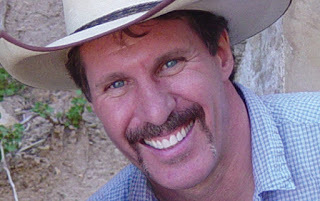
He is still determined to be a Renaissance Man in an age that lauds the specialist. The Huffington Post says Carew "intrigues and enlightens, charms and catalyzes change for every reader."
Carew loves nothing better than a good laugh, a great scotch, and a classic read. If he could write books while riding horses, climbing mountains, or skiing any powder snow—anywhere, then life would almost be perfect.
Want to find out about Carew’s next adventure? Or wild book signing? Or TV show? Or even next book? Please check out his website at http://www.carewpapritz.com and sign up to receive email updates, or just enjoy a moment with Carew and The Legacy Letters!
To read a list of some of Carew's remarkable achievements and read a full description of
The Legacy Letters, click HERE!

He is still determined to be a Renaissance Man in an age that lauds the specialist. The Huffington Post says Carew "intrigues and enlightens, charms and catalyzes change for every reader."
Carew loves nothing better than a good laugh, a great scotch, and a classic read. If he could write books while riding horses, climbing mountains, or skiing any powder snow—anywhere, then life would almost be perfect.
Want to find out about Carew’s next adventure? Or wild book signing? Or TV show? Or even next book? Please check out his website at http://www.carewpapritz.com and sign up to receive email updates, or just enjoy a moment with Carew and The Legacy Letters!
To read a list of some of Carew's remarkable achievements and read a full description of
The Legacy Letters, click HERE!
Published on December 15, 2015 16:32

